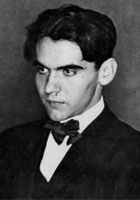Ballad Of The Moon Poem by Federico García Lorca
Ballad Of The Moon
translated by Will Kirkland
The moon came into the forge
in her bustle of flowering nard.
The little boy stares at her, stares.
The boy is staring hard.
In the shaken air
the moon moves her amrs,
and shows lubricious and pure,
her breasts of hard tin.
"Moon, moon, moon, run!
If the gypsies come,
they will use your heart
to make white necklaces and rings."
"Let me dance, my little one.
When the gypsies come,
they'll find you on the anvil
with your lively eyes closed tight.
"Moon, moon, moon, run!
I can feelheir horses come."
"Let me be, my little one,
don't step on me, all starched and white!"
Closer comes the the horseman,
drumming on the plain.
The boy is in the forge;
his eyes are closed.
Through the olive grove
come the gypsies, dream and bronze,
their heads held high,
their hooded eyes.
Oh, how the night owl calls,
calling, calling from its tree!
The moon is climbing through the sky
with the child by the hand.
They are crying in the forge,
all the gypsies, shouting, crying.
The air is veiwing all, views all.
The air is at the viewing.
Part 1==This is the first poem in his book and it sets the tone and also signals the role of the moon and other natural elements in the book. The moon comes into the smithy dressed as a woman, and dances lasciviously in front of a little boy, casting a spell on the boy through rhyme and repetition: [see reference below]
Part 4== A barn owl hoots, and through the sky goes the moon, taking a boy by the hand. The boy’s body lies inside the smithy, but his spirit has gone with the moon. The gypsies, upon discovering their loss, commence to wail and shout. Outside, the air, this time a sympathetic element of nature, watches over them. [see reference below]
Part 2==“The boy is entranced but warns the moon that she must flee before the gypsies return or they will chop her up for necklaces and silver rings, typical gypsy jewelry. The words that he uses to caution the moon are incantatory, “Run away, moon, run away, moon.” [see reference below]
Part 3==The moon, however, refuses to be frightened and answers the boy with her own prediction: When the gypsies come, they will find you on the anvil with your tiny eyes shut. Enthralled, the boy draws near. A rider is heard galloping across the plain, and in the smithy the boy’s eyes are shut.[see reference below]
Shadows of Yeats lost child but a more mature life stage still the perplexing good and bad and price to pay for the joy
This poem has not been translated into any other language yet.
I would like to translate this poem
It says that 73 votes were cast about this poem, yet I am the first to comment. I wish the highly trained minds among us had commented - I would glean so much and learn so much from their thoughts. What struck me, what enveloped me, is the sheer beauty of this poem. I do not know how that beauty was created- whether it was its rhythms or its choice of words or the choice of details. All I know is that I was ensnared and want to read this again and again.